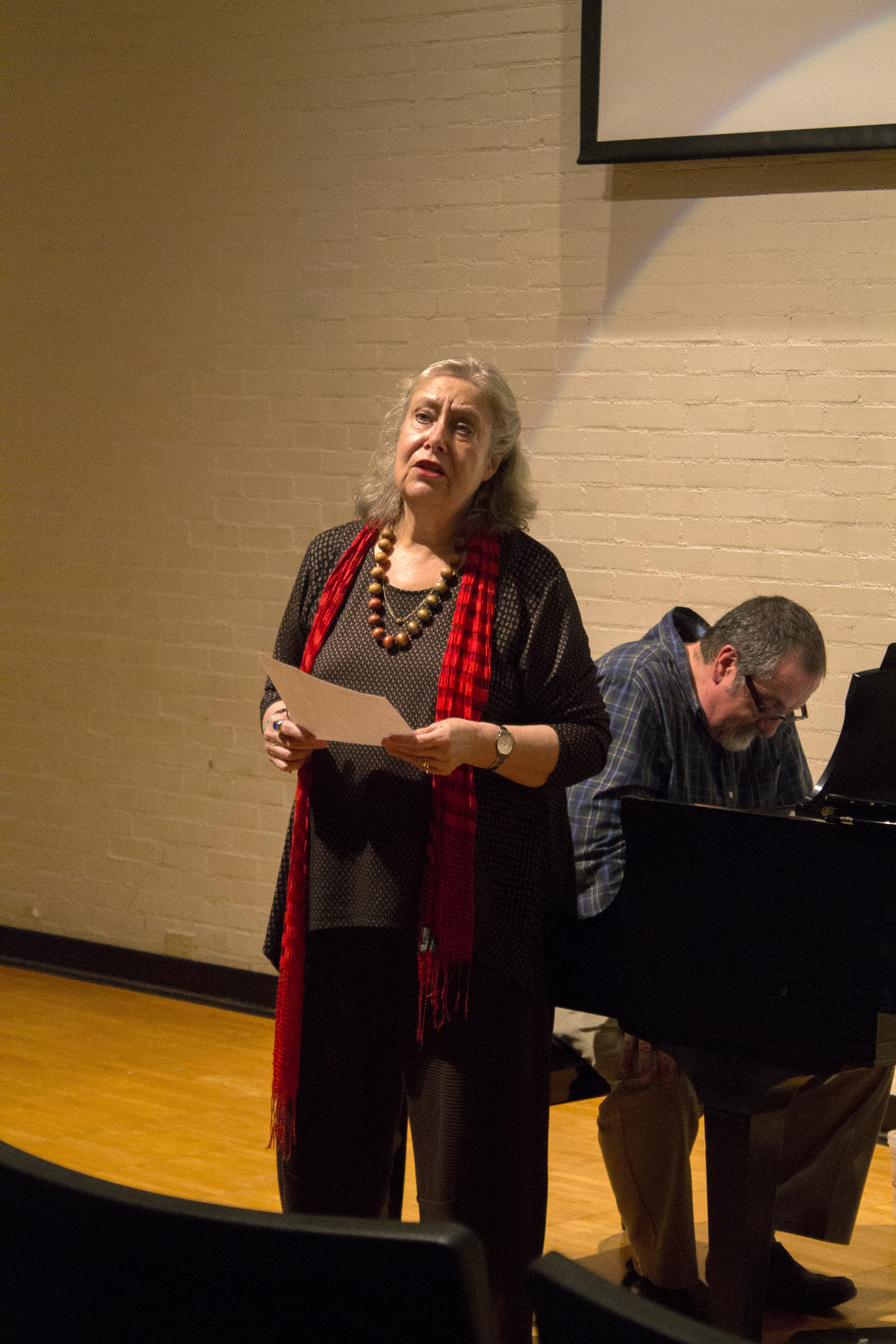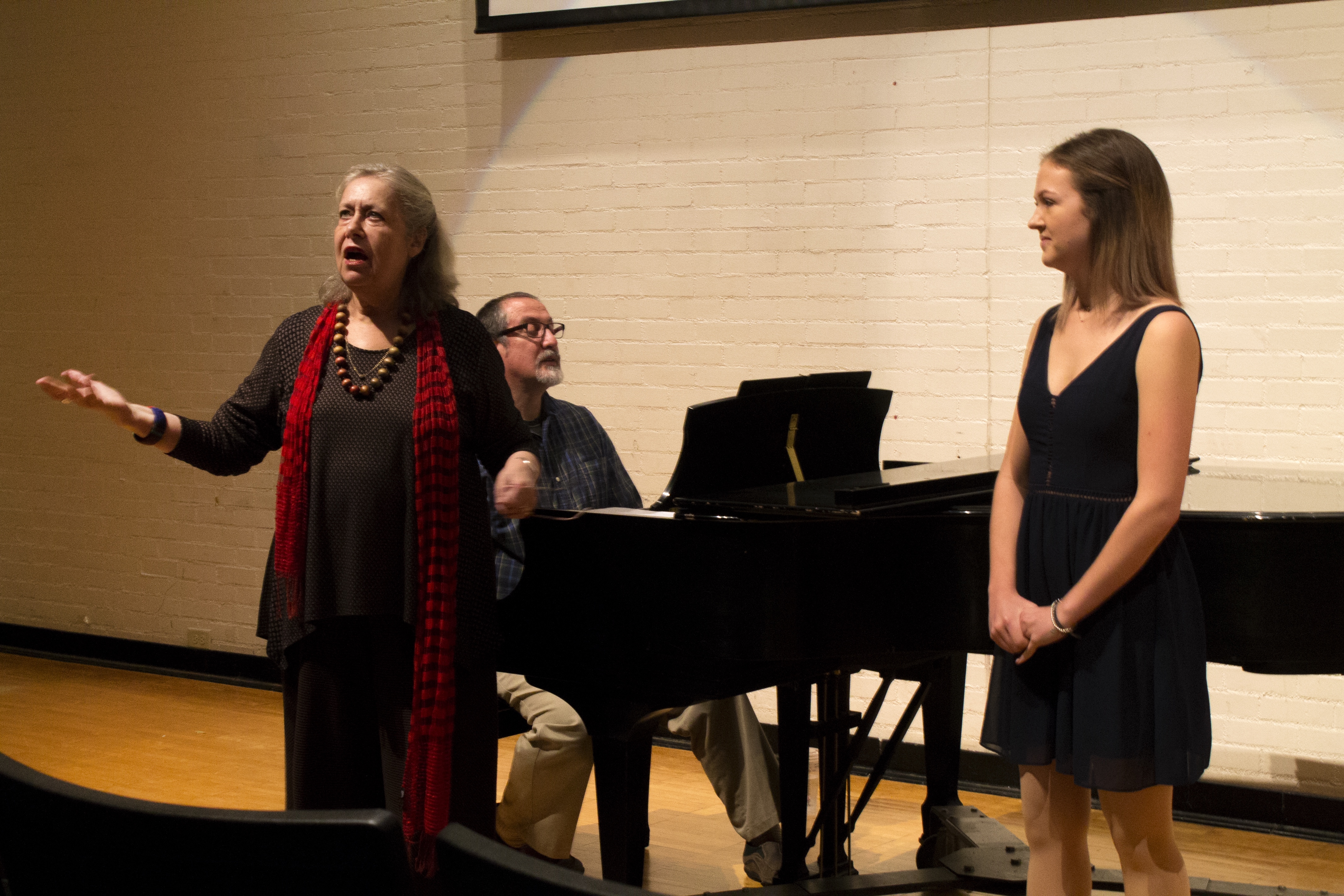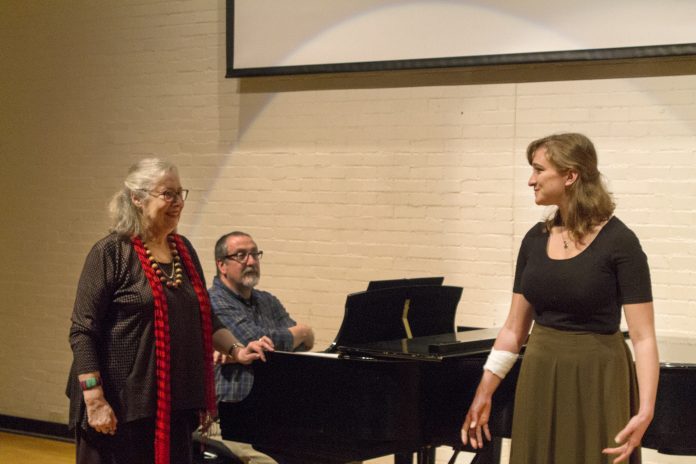Gaining a global perspective on any topic is difficult to achieve whilst confined to a college campus – though we can read as many papers and watch as many films as we’d like (or as our professors require us to), we cannot interact with other ways of thinking directly. Only in special circumstances are perspec- tives like these given names and faces, embodied within people who can gift students with their knowledge as informed by a non-Muhlenberg history.
On Oct. 12, the Recital Hall became a site of one such exchange of viewpoints. Mira Zakai, a Professor of Music at Tel Aviv University and accomplished opera singer in her own right, taught a guest master class for four Muhlenberg voice students. With her unorthodox, upbeat teaching method, Zakai’s exuberance filled each student and observer with her passion for having fun while simultaneously doing important work. Laura Santo ’20, one of the four selected students, recalls her experience with Zakai as an eye-opening one.
“It was just a joy to be able to sing for such an experienced woman,” Santo said. “I love that Muhlenberg brings in guest artists to lead lessons. As an artist, I feel that one can only benefit from having feedback and training from a new set of ears, and being able to work with someone as accomplished as Mira Zakai is an opportunity to grow and work on your art.”

Zakai’s method was unlike anything I had seen before. Each student initially sang their piece without direction, following what they had practiced in their lessons in a performance for the crowd of observers, which included voice teachers and students alike. After each singer was finished their first sing-through, however, Zakai talked about the composer and history of their pieces using notes she had assembled beforehand. Eliana Swartz ’19, an audience member, was struck by Zakai’s skillful intention in providing the background of each piece.
“…[Zakai] spoke about Handel and how nowadays everyone does different ornaments… in Handel’s music, and then there are some composers that are around Handel’s time which also fall under that, and understanding the music history portion can…help you really connect to the song,” said Swartz. “It just makes you more of an educated singer rather than just singing a song, and even though we want to assume that the singer is educated about it, you can’t assume [that].”
Zakai maintains that making sure each singer knows their context is one of the keys to vi- ability as a vocalist.
“Read, go to museums…do a lot of research around the music, not in the music. What was the time, what were the artists, what were the painters, the writers?” Zakai said. “I mean, take in a lot of background inspira- tion and then go back to the music and see how it connects…be true to yourself, and study and invest a lot in knowing your body. [Your body needs] to be in good shape, to be athletic. Youhavetobeonalevelofa professional athlete in order to be a singer…I mean, when you have a violin that gets tired, you give it to a violin maker, and he corrects it. Here, there are no [spare] parts.”
Zakai herself did not commit to following her passion until she was twenty-eight – after finishing her university education, Zakai pursued a career in opera with a job and family to fall back on should things go awry. Though at first employers “didn’t like [her] nose” and thought her “brains were too loud,” she eventually found sol- id footing and made the profession her own, crafting stories to every song she sang and ensur- ing that every day was a good day.

This philosophy was evident in Zakai’s teaching, in which she peppered useful advice with extraordinary candor: “Try something else,” she urged Carly Dove ’18, “don’t think.” Bailey Fulginiti ’18 was encouraged to “see the sound and feed it all the time.” Santo reflects on this whimsical and plaintive technique as one that might be applicable beyond the walls of the Recital Hall.
“I really valued her insight into each of the pieces, but…I also felt that the specific feedback she gave to each singer held important information for most (if not all) singers, and was grateful I got to hear what she said to my fellow singers,” said Santo. “For example, when she had Carly [Dove] skip during her song to release tension and trust her body, or when she had Shelby [MacPhail ‘18] speak through her lyrics, I felt that I could definitely apply those techniques to my own practice to improve my singing.”
As the observers watched on, Zakai’s tips became actively embodied within each student she taught. When Dove let go of all convention and twirled around the stage while singing, sometimes joined by Zakai, her joyful tune filled the entire hall with a new musicality. She truly allowed the song to take her where it wanted to go, her voice flourishing as she set it free. It was a magical moment that was mirrored in one way or another by each student in turn, each with their own areas of improvement and triumph. Being able to openly watch this experimentation and eventual success was an invaluable experience for all who observed, including Swartz.
“[It’s important that events like these are open to everyone] so that we can understand a wide scope of music,” Swartz said. “I feel like a lot of people can go to a cappella concerts, and that’s great, that’s, like, one form, but if an opera workshop is open to people that may be interested, or teachers encourage their students to go, then you’re just getting more culture.”
The intersections of different forms of work are what make guest speakers integral to a well- rounded educational experience not only in the music field (which recently enjoyed not only a visit from Zakai, but also from jazz group Michael Sarian and the Chabones), but also in the general sphere of academia. Providing a platform from which different points of view can contribute to a new and exciting conversation about any number of topics is what can make the difference between staying stagnant and moving – or, as Zakai might suggest, dancing – forward.
Brooke is a senior double majoring in English and Media & Communication. She's passionate about french toast, Kate Bishop, Steven Universe and the ocean coasts of Ireland. On campus, she is a Writing Tutor, Orientation Leader and member of the Girls Next Door, Muhlenberg's all-lady a capella group. She could not be more excited to serve as your Editor-In-Chief this year!






















